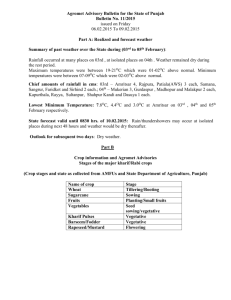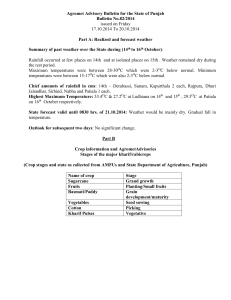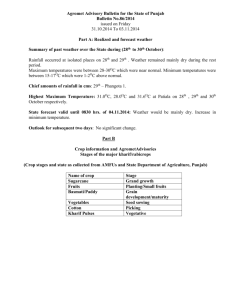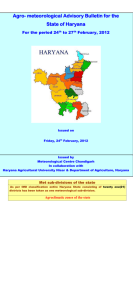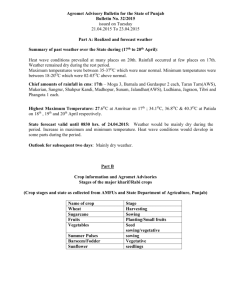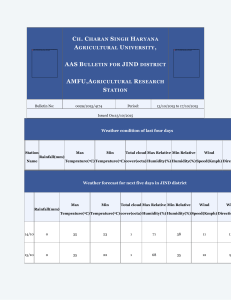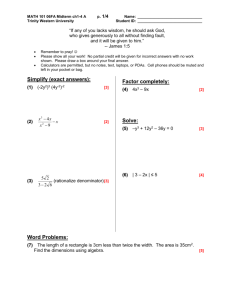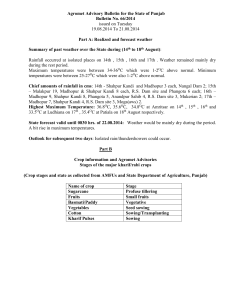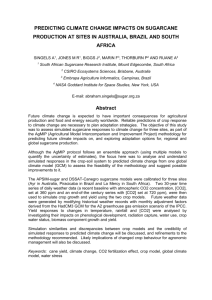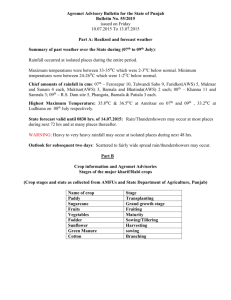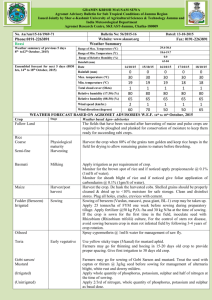Advisory Punjab 13.02.15
advertisement
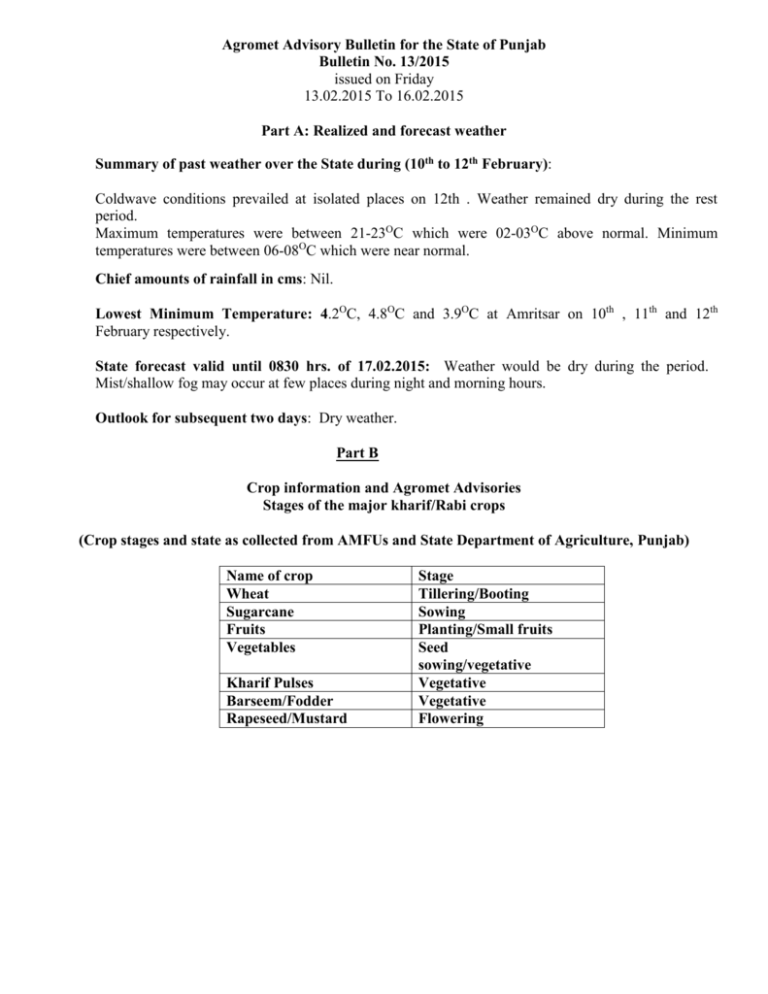
Agromet Advisory Bulletin for the State of Punjab Bulletin No. 13/2015 issued on Friday 13.02.2015 To 16.02.2015 Part A: Realized and forecast weather Summary of past weather over the State during (10th to 12th February): Coldwave conditions prevailed at isolated places on 12th . Weather remained dry during the rest period. Maximum temperatures were between 21-23OC which were 02-03OC above normal. Minimum temperatures were between 06-08OC which were near normal. Chief amounts of rainfall in cms: Nil. Lowest Minimum Temperature: 4.2OC, 4.8OC and 3.9OC at Amritsar on 10th , 11th and 12th February respectively. State forecast valid until 0830 hrs. of 17.02.2015: Weather would be dry during the period. Mist/shallow fog may occur at few places during night and morning hours. Outlook for subsequent two days: Dry weather. Part B Crop information and Agromet Advisories Stages of the major kharif/Rabi crops (Crop stages and state as collected from AMFUs and State Department of Agriculture, Punjab) Name of crop Wheat Sugarcane Fruits Vegetables Kharif Pulses Barseem/Fodder Rapeseed/Mustard Stage Tillering/Booting Sowing Planting/Small fruits Seed sowing/vegetative Vegetative Vegetative Flowering Crop Advisories and Plant Protection: Wheat: Under prolonged cloudy weather, aphids may harm by discolouration of wheat leaves. Spray 40ml of imidacloprid 200 SL or 20g of thiamethoxam 25 WG or 12g of Dantop (clothianidin 50 WDG) or 150ml of Rogor 30 EC (dimethoate) or Metasystox 25 EC (oxydemeton methyl) in 80-100 litres of water/acre using knap sack sprayer or in 30 litres of water/acre with power sprayer. Sugarcane: Farmers are advised to start sowing of recommended sugarcane varieties like CoJ-85, CoJ-83, CoJ-64 (early maturing), COH-119, CoJ-88, CoS-8436 for and CoJ-89 (mid season). The sets selected for planting should be free from diseases. Animal Husbandry: Dry bedding to animals helps to save them from cold. Entry of very cold winds inside the shed should be minimized. Keep the animals under roof in night and in the sun during the day time. Do not apply milk for lubrication of teats after milking. To avoid cracking or fissuring of teats in cold dry weather clean the teats with warm water and apply ghee or butter or teat dips (glycerine Providone Iodine 1:8) after every milking. Feed well chaffed berseem mixed with wheat straw to avoid Aphara. Vaccinate animals against FMD and repeat after six months or yearly as required. Deworming should be done in calves especially against Ascariasis/Malap with piperazine liquid 4 ml/ 10 kg body weight. New born calves need special care in cold weather. They are susceptible to Pneumonia and large numbers of them die due to this disease. Keep them warm by providing clean and dry bedding. Give them vitamin ‘A’ concentrate 1 ml daily in milk for three days to be repeated after a month. Poultry: Provide the curtains at windows in poultry sheds. The temperature should not go below 60º F inside the poultry sheds and suitable measures like doubling of curtains should be taken. Keep the chicks warm by giving them artificial heat according to age. For the first week internal temperature of the shed should be 90-95º F and it should decrease 5º F per week or according to weather conditions. Poultry ration should have more energy. Increase cereals by 5-8% in the ration by reducing the rice bran. Add coccidiostat in the ration to prevent its occurrence. Do not store the feed for more than 15 days. Fruits: It is the right time for planting of deciduous plants namely Peach, Palm, Pear and Gap. Apply farmyard manure and inorganic fertilizers (Superphosphae and Murate of Potash) in Peach, Palm and Pear. The incidence of the Powdery mildew disease may be reduced by spraying the ber plantation with karathane 40 EC @ 50 ml or Bayleton 25 WP 50 g per 100 litres of water. The South-West side should be left open to allow sufficient light. Vegetables: Under clear and dry weather forecast for next five days, cucurbit growers are advised to complete the sowing of summer squash. Rapeseed Mustard: This time weather is conducive for severe attack of mustard aphid. Monitor the crop regularly, if pest population reaches to ETL, spray the crop with Actara 25 WG @40g /acre. If crop is raised for vegetable (saag) purpose, use Malathion only @ 400g/acre. Wait for one week after spraying to pluck saag. Spraying should be done in the afternoon when the pollinators are less active. Fodder: First cutting of early sown oats may be taken during this month to meet the fodder scarcity. Avoid taking 2 cuttings from oats where heavy infestation of the Poa is there Lucerne cutting can be adjusted to provide fodder during the lean months. Honey Bee: After prolonged cloudy, foggy as well as rainy spell, the honey bee colonies may suffer from shortage of stored honey. Under such circumstances, the colonies should be given feeding of concentrated sugar syrup (2 parts sugar: 1 part water).
